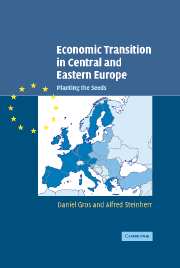Book contents
- Frontmatter
- Contents
- List of figures
- List of boxes
- List of tables
- Acknowledgements
- Introduction
- Part I The rise and decline of communism: an overview
- Part II Transition: 1990–2000
- Part III Extreme cases for reform: scope for disagreements
- 6 German unification: an example of big-bang reform
- 7 The disintegration of the Soviet Union
- 8 Russia: after a lost decade, the phoenix rises from the ashes?
- Part IV The new Europe from the Atlantic to the Urals
- References
- Index
6 - German unification: an example of big-bang reform
Published online by Cambridge University Press: 05 June 2012
- Frontmatter
- Contents
- List of figures
- List of boxes
- List of tables
- Acknowledgements
- Introduction
- Part I The rise and decline of communism: an overview
- Part II Transition: 1990–2000
- Part III Extreme cases for reform: scope for disagreements
- 6 German unification: an example of big-bang reform
- 7 The disintegration of the Soviet Union
- 8 Russia: after a lost decade, the phoenix rises from the ashes?
- Part IV The new Europe from the Atlantic to the Urals
- References
- Index
Summary
East Germany used to be considered as the model economy of the socialist bloc. Yet, after unification, little of that economy seemed worth preserving. But the East Germans seemed to be luckier than their eastern neighbours, for reform and reconstruction there would have West German support of a magnitude unavailable to any other former socialist country. Overnight, unification provided the framework and the institutions needed to operate as a market economy and gave access to the financial and managerial resources of West Germany. East Germany thus obtained the necessary legal framework at the stroke of a pen when the unification treaty came into effect on 3 October 1990. Moreover, monetary union (1 July 1990) brought an untrammelled price system, a stable and convertible currency and an efficient capital market. Privatisation was also quickly begun under the management of the Treuhand Agency (THA).
Seen against this backdrop, which combined conditions ideal for a big-bang reform and considerable financial support, East Germany's subsequent vicissitudes are incomprehensible to many. Are the disappointing results due to avoidable policy errors, or was the initial collapse of the East German economy a normal consequence of a big-bang reform that should have been anticipated from the outset? Most observers will acknowledge that the difficulties of restructuring the economy of East Germany may have been underestimated, but they all have their own theories as to the policy errors that may have been made.
- Type
- Chapter
- Information
- Economic Transition in Central and Eastern EuropePlanting the Seeds, pp. 163 - 186Publisher: Cambridge University PressPrint publication year: 2004



